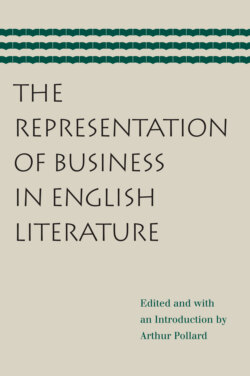Читать книгу The Representation of Business in English Literature - Группа авторов - Страница 13
На сайте Литреса книга снята с продажи.
CIVIC HUMANISM
ОглавлениеThe rhetoric which they employed to articulate this resistance has also been identified as “civic humanism.” The leading historian of this ideology is Professor J. G. A. Pocock.12 He traces its pedigree to Machiavelli’s cynical exposure of the motives of politicians, and how men in power constantly endeavour to become more powerful. Virtuous citizens must therefore be perpetually vigilant to resist moves by those in authority to undermine their liberty. These Machiavellian notions were transmitted into English political discourse in the eighteenth century through the medium of James Harrington’s Oceana, written in the mid-1650s as a solution to the problem of preserving the English republic. His investigation of English history in the previous two centuries had led him to the conclusion that power was ultimately based on landed property. Thus he argued that, before the advent of the Tudors, there had been what he termed a Gothic constitution in which the power of the Kings, the Lords and the Commons had been more or less equal. This was because the Crown, the nobility and the gentry had each owned roughly similar amounts of land. Between 1485 and 1640, however, the Crown and the nobility had alienated land to the Commons. This shift in landed wealth caused an accompanying shift in the balance of power, from the Crown and the Lords to the Commons. The readjustment resulted in the Civil War. As Harrington put it, the dissolution of the Gothic constitution caused the war, not the war the dissolution of the constitution. He was concerned to prevent a similar seismic movement which would cause the Commonwealth to collapse, and proposed an agrarian law which would stop men from acquiring enough landed property to threaten the stability of the republic.
With the Restoration in 1660 the Gothic constitution was restored. In constitutional theory the Crown, Lords and Commons were again equally balanced forces. This was regarded as a perfect polity, since at any time two of the three could offset the tendency of a third to acquire more power. Thus the Crown and the Lords could combine to defeat a bid by the Commons to create a democracy, the Crown and the Commons could between them prevent the Lords from aspiring towards oligarchy, and the Lords and Commons could defeat the Crown’s bid for tyranny. During the 1680s, however, the Crown came near to erecting an absolute monarchy by keeping parliament in abeyance. The Glorious Revolution was therefore held to have restored equilibrium. The Country writers, however, urged that the subjects should exercise eternal vigilance to prevent it being overturned again. They argued that it was threatened by the development of the fiscal-military state. The growth of the armed forces posed a direct threat, while the Financial Revolution threatened it indirectly. Thus the Court’s special relationship with the City gave it opportunities to corrupt the independence of Parliament and ultimately of the electorate. The South Sea Bubble narrowly averted the complete subversion of the constitution. Hence the hostility of Country rhetoric to the new machinery of public credit.
Professor Pocock sees this rhetoric in the form of civic humanism as the dominant paradigm of the period before the French Revolution. It certainly was influential, not least in the ideology of colonial resistance to British claims of sovereignty in the War of American Independence. But there were other ideological stances less inimical to the institutions of public credit. As we have seen, Addison and Defoe both welcomed the City’s relationship with the state. Bernard Mandeville was another who positively advocated the advantages of the fiscal-military state. His Fable of the Bees took issue with those who criticised it for being a means of corrupting the constitution. Mandeville did not deny that it was corrupt—on the contrary, he depicted it as being soused in corruption up to the ears. But where its critics saw this as a source of weakness he asserted that it was a source of strength. As he expressed it in a notorious paradox, “private vices, public benefits.” The paradox he explained by asserting that such vices as lust and envy generate consumer demand which stimulates the economy.
